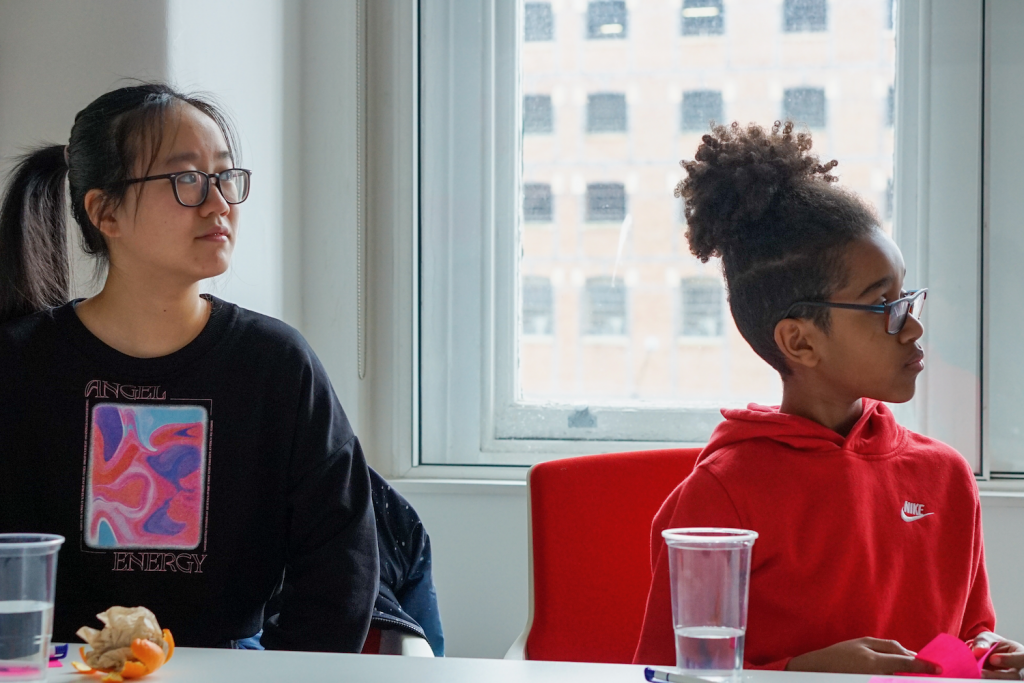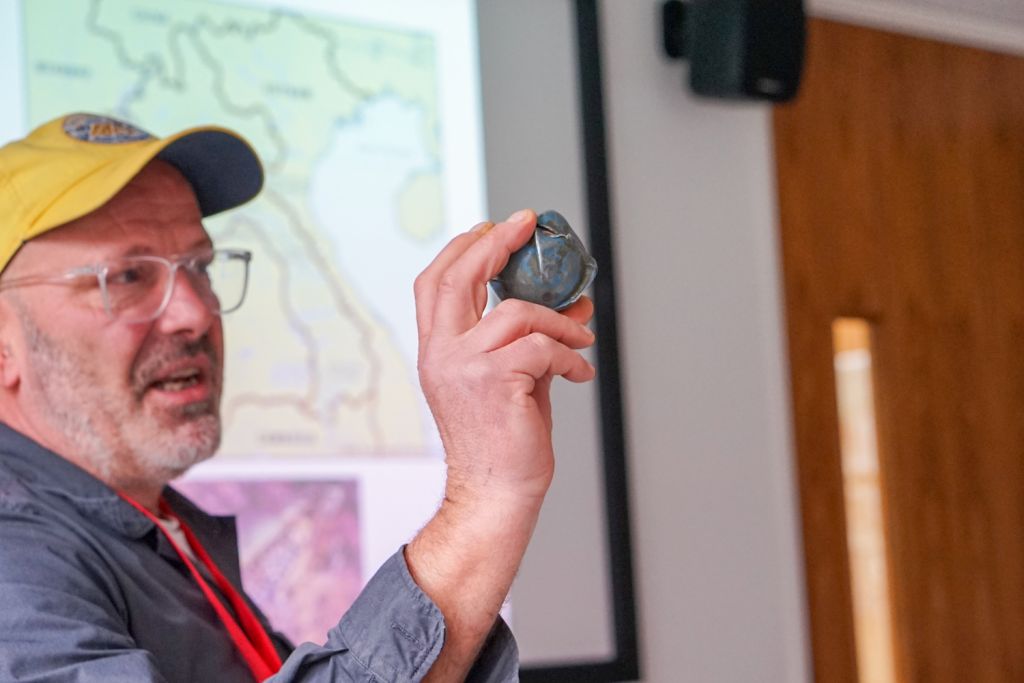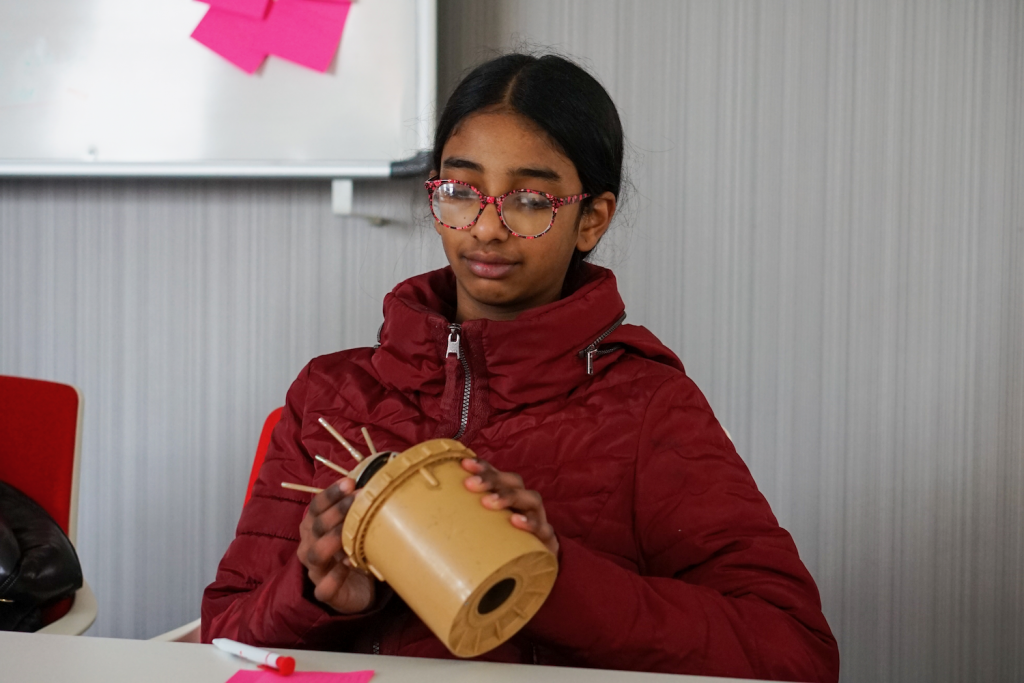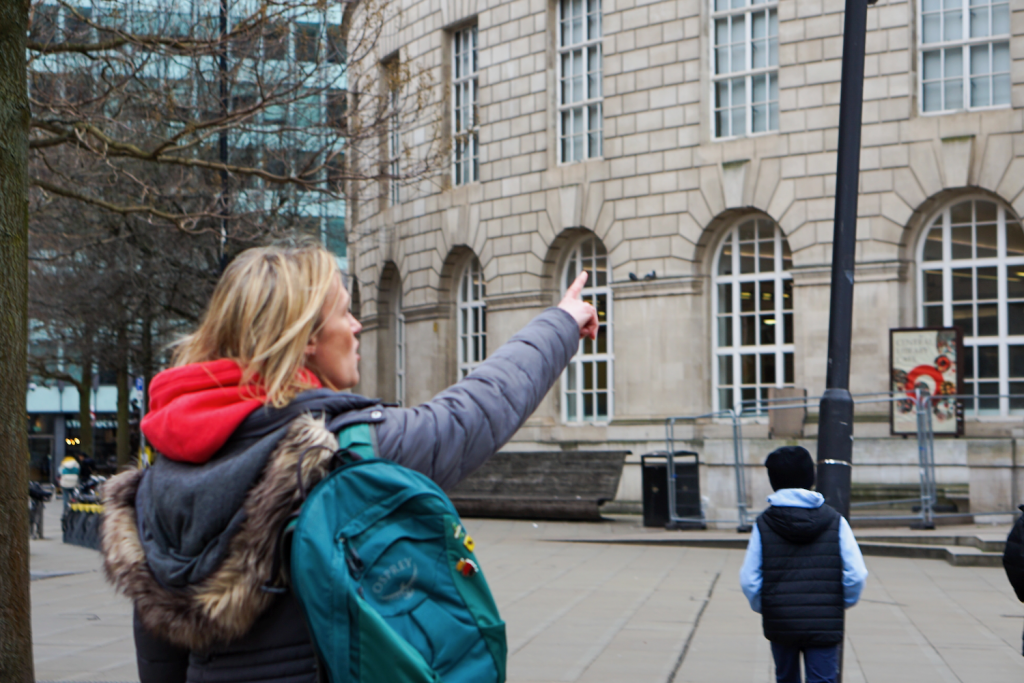Dr Marie Molloy is a Senior Lecturer in American History at Manchester Metropolitan University (MMU), and has been a co-ordinator at MMU’s Society&Change Saturday Club for three years. Here she speaks to new Club tutors Katie and Emma about the processes involved with developing and facilitating a Saturday Club.
Marie Molloy (MM): How would you say we approached the programme planning and curriculum development of the Society&Change Saturday Club at MMU?
Katie (K): It was a very collaborative process. While I kind of came from an education background, Emma and yourself have different experiences and connections so it was nice to have three different ways of approach.
MM: I think we considered accessibility, inclusivity, and engagement. It was a lot about understanding different learning styles, different personalities, different access needs at the point of programme design and still being aware that you can alter things as you get to know your group. I totally agree with Katie too. I’ve been a part of this Club for two previous years with different tutors, and it’s always unique. Thinking about your background in Criminology, Emma, and yourself Katie, you have experience as a teacher, but you’re also a Historian. So we have us as individuals and what we’re interested in, but also what’s happening in the world, major topics facing the younger generations today, and how can we bring those things together with contextual relevance.
Emma (E): Yeah, I didn’t want it to just be, you know, session after session highlighting the problems of the world. We also factored in how to empower the young people.
K: Absolutely. Even in the first session, a basic introduction to human rights, we facilitated the space for understanding, to give context to an issue. But then also giving them the voice to think about it, to ask ‘what could we do about this?’ or ‘what kind of control could I have in this scenario?’ And as you said, Emma, it’s giving them that power to think, well, ‘what’s my next step gonna be?’

MM: This is something that struck me about you two right from the beginning. I thought you were really interested in giving power back to the young people, and that you thought about how they are also agents of change. As Emma said, it’s not just discussing difficult and challenging topics, but thinking about solutions to them. It’s solutions-driven, and that’s so powerful. That’s what the programme is about.
E: I would just expand on that, Marie. It’s also about the Club members finding their own solutions and nurturing the confidence for them to have a voice in these matters too.
MM: Right. I got the sense of that in the first session when you were talking to the Club members about the programme but you said there’s flexibility. I think that’s fantastic. I guess that goes on to my second question which is: how do you think we’ve used our different areas of expertise?
K: I did my undergrad at MMU in English and History, where we covered a lot of different issues and research. And then I taught for three years, where I had experience doing things relevant to the Saturday Club, like exploring artefacts and heritage and their placement in museums. It’s nice to be able to bring things I’ve done previously and adapt and refresh them for different age groups.
MM: I love teaching in a university environment, and I love the outreach work I do as Department of History, Politics and Philosophy lead with schools that come onto campus. In terms of other previous experience, many years ago I spent a year teaching in South Africa and I was encouraged to think creatively about the way I taught to hundreds of children in a lesson. I wanted to bring all of my interest and knowledge about education into the classroom, and I still feel that way. It’s wonderful to work with young people and also with you two, as Club tutors, to design an interesting programme.

E: I don’t feel like I’m taking too much from my Masters in Criminology, however, my undergrad was in Social Policy and everything I learned from that shapes my approach to everything else. Unlike Katie, I hadn’t worked with young people before, but a part of my previous job was working with rough sleepers with untreated mental health problems. It was my job to go and find creative ways of engaging. Working with vulnerable people has affected my approach to the Saturday Club. I look at the design of the programme to ensure it’s one that works for everybody.
MM: With our combined unique experiences we all learn so much from each other. And I would say we learn as much from the Club members as they do from us. It’s really a kind of symbiotic process and I think that’s what makes the Club really rich. We’ve also reached out to various guest speakers and facilitators and it’s interesting to think about our approach. You know, what’s worked well?
K: We had a long list of potential guests. We looked at gaps in our knowledge and where we could receive support. Steven Poleon visited for a guest session on migration, racism, asylum claimants, and Preston’s banana boats, and there’s another guest session with Dr Jennifer Cromwell looking at the representation of characters, culture, and heritage in video games.
E: They come with so much experience but it’s also about gauging how their experience fits with the Club members’ interests and the general vibe of the programme.

MM: Thinking about careers, how would you say an understanding of careers was factored into the programme?
K: I’d say our main focus was the themes and then careers came as something parallel to that. For example, Jenny Cromwell discussing video games could spark career ideas, but we also have a trip to Manchester Central Library to go into the archives. That’s relevant to being a Historian or Archivist. We even have a session planned at the MMU Moot Court, which is a simulation of the court environment. One of the Club members has already mentioned being interested in pursuing a career in linguistics, and another in journalism.
E: I think it’s also important to consider value-based exploration too, like the self-portrait project and Summer Show at Somerset House. Those personal values are equally important. What’s important to them? What inspires them? What do they care about, and what can they do with that? Things like our sessions on protest are also about community involvement and involvement with the world, not just specific careers.
MM: What advice would you give for navigating difficult or challenging topics with a younger audience? I was thinking about your first session and how it was such a good framework, for example not just talking about difficult subjects as a problem, but thinking in terms of solutions.
E: It’s like, what’s the purpose of us having this conversation? The Club members decided on what topics arose, and if they have the confidence to bring them up, the very least we can do is respect that enough to facilitate a safe conversation. They deserve to be heard and I don’t think we should shy away from these conversations, but they should be done with an awareness of what’s being said.
K: Absolutely. I mean, it was one of the young people that brought up something they wanted to cover because they understood that social media presents things to them in a certain way, or different voices will present things with certain biases, and they wanted to understand without an external influence. When I was teaching in primary school that was child-led learning, but here it’s also a similar principle, just on a different scale. You’re leading, and you’re allowing them to lead. I think we had a conversation about the voting age and there were some opposing views, but we’re able to discuss things in a safe environment while recognising boundaries.

MM: Fantastic, so, why do you think it’s central for young people to develop critical and creative thinking skills?
K: I think both are really important, especially when it comes to the topics we’re covering, like analysing the media. It’s so important to make observations and really think of what’s being inferred and what’s being withheld. Where critical thinking is that initial observation or judgement, creative thinking is the next step to thinking about solutions.
E: Yes, the critical thinking is like the filter of information coming in, but the creative thinking is about the empowerment for them to then go out into the world.
MM: Why do you believe it’s essential for young people to engage with the topics covered at MMU’s Society&Change Saturday Club?
K: We cover LGBTQIA+ rights and history, marginalisation in our in our crossover with the Writing&Talking Saturday Club at MMU, racism and asylum claimants, a range of other topics that interest them, and more current topics that come up in the media. These are things that are important to our culture, especially when it comes to the impact on human rights. We look at how to protect marginalised groups, and at case studies to see how things might not be legally progressing as they could be.

MM: I was also thinking about how it’s really important for people to come along to a club like Society&Change Saturday Club at MMU because it’s an opportunity to go beyond the topics that are covered at school and to be able to diversify what you’re learning about the world, which also does help with what you’re learning within the school environment. It’s about what’s happening in the world in which those young people are living, and how to make sense of it. To be able to openly express your ideas and to listen to other ideas that you maybe wouldn’t otherwise hear. It’s really empowering and a fantastic way to spend three hours on a Saturday morning.
K: Absolutely, absolutely. It’s another point of view, another safe place where you can go and have open, honest conversation.
MM: What parts of the Saturday Clubs do you most enjoy?
E: It’s not necessarily a specific part or session, it’s more like a point in the programme that’s different for each young person who attends. I was a lot older than the Club members when I knew what I was passionate about or what motivated me. I didn’t get that through education. For the young people coming through the Saturday Club, they’re going on that journey of finding out what’s important to them. It’s the point where they have that realisation, when the penny drops.
K: I love that. I just love witnessing it on anybody’s face when they have that moment of, like, actually, ‘yes, that’s for me,’ or ‘I understand that now,’ or, ‘that’s what I want’.
E: I call it a sort of fire in your belly. It could change for each young person and maybe not all will find it, but how amazing that we get to facilitate that, that we get to show them all these different things and all these different options and experiences and conversations and be like ‘which one is it gonna be or which one could it be?’
K: You know, even if it’s maybe not for some of them, it’s a start. They’ve got the tools in their hands. What a privilege that is to be a part of.
E: It’s true, just being a part of that is a privilege.

MM: I totally agree. Being part of the National Saturday club collaboration with MMU is an absolute privilege. Every year is different and every session is different because the the Club members who come along make it different every time. Watching how they learn, we learn just as much. I love seeing the friendships form in the groups and the confidence that grows. I always really look forward to going down to London for the Summer Show and graduation ceremonies, it’s such a proud moment.
K: I’ve just made a note to include several packets of tissues for the trip down to London because I know I’m just gonna be crying!
MM: It’s just a really wonderful thing. I think we need to celebrate young people and all the amazing things they can achieve so much more. They can sometimes not get enough credit for how hard things can be and how much they’ve got to manage. Hopefully one day there’ll be a Saturday Club for every single student across the country that would like to go. Wouldn’t that be an amazing thing? Well, it has been really interesting hearing about your ideas about the Club, and you’ve done a great job.
I really appreciate it and all of the hard work you’ve put in. All of your ideas are fantastic. Thank you both.
The History, Politics and Philosophy Department at Manchester Metropolitan University runs an exciting Society&Change Saturday Club that enables Club members to explore a range of important issues that affect society and how we live, both in the past and in the present day. Find out more about the Club.




Interview edited by Anisha Jackson